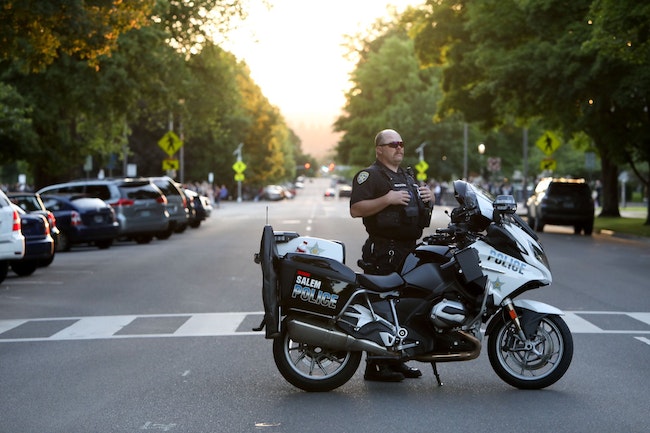 A Salem police officer blocks Court Street to allow space for a protest on Monday June 1, 2020. (Amanda Loman/Salem Reporter)
A Salem police officer blocks Court Street to allow space for a protest on Monday June 1, 2020. (Amanda Loman/Salem Reporter)
The union representing Salem police officers is in favor of buying body cameras, but the request is unlikely to come to fruition anytime soon because of the hefty price tag for storing footage.
Scotty Nowning, Salem Police Employees Union president, wrote to city councilors on June 24 to ask that the Salem City Council consider buying body worn cameras “to increase the transparency of the review of the actions that our officers take as guardians in our community.”
Nowning, a detective, told Salem Reporter he sent the letter to council after surveying officers who were overwhelmingly in support of body cameras. He had heard reports of other police unions rebuffing body cameras and wanted to show Salem’s support.
In the letter, Nowning argued that the cameras would increase the public’s trust of police because they would show that officers show up to serve the community in a professional and unbiased manner.
DOCUMENT LINK: Body cam memo
Nowning said with body cameras, people can view police interaction themselves, which increases transparency and accountability of officers.
Salem Police Department spokesman Lt. Treven Upkes said his department first floated the idea of body cameras five years ago but always ran up against the cost.
The city has estimated a body camera program could cost close to $225,000 a year, mostly for data storage costs. Such a program would also require a staff member to pull video requests and redact sensitive information when the recordings are sought by lawyers or the public.
The Marion County Sheriff’s Office got a $99,000 grant to start a program in 2016, but ultimately returned the funding after determining it wasn’t going to launch such a program in time to meet the grant deadlines.
Sgt. Jeremy Landers, Marion County Sheriff’s Office spokesman, said his agency faced many of the same hurdles others do: long-term costs, staffing to manage and coordinate footage requests and IT infrastructure to support hours and hours of video generated by body worn cameras.
“The initial cost of a [body worn camera] is relatively small in the grand scheme of things. The storage requirement can be significant. For a single deputy wearing a [body worn camera] for their entire shift each day of the year that amounts to approximately 2,080 hours of video. As you can imagine when you put a body cam on each deputy the sheer volume of video grows exponentially,” Landers said in an email.
Other large cities in Oregon have had body camera programs in the works for years that stalled due to a lack of funding.
Portland Mayor Ted Wheeler told the Oregonian that body cameras wouldn’t be deployed for Portland police after the city set aside more than $2 million for the program. He said that money would be needed to aid in the city’s Covid response.
In Springfield, the city is moving ahead with buying the cameras after having a plan in place since 2015. That program is expected to cost $311,000 in its first year.
Bend has chosen to explore a body camera program and set aside $100,00 this year for it.
SUPPORT ESSENTIAL REPORTING FOR SALEM – A subscription starts at $5 a month for around-the-clock access to stories and email alerts sent directly to you. Your support matters. Go HERE.
Have a story tip? Contact reporter Saphara Harrell at 503-549-6250, [email protected] or @daisysaphara.









